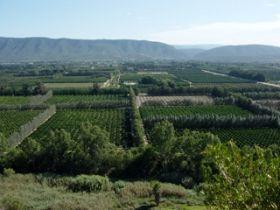
While the South African citrus sector still has five months to go before wrapping up its 2018 season, and deciduous fruit and table grape growers are pruning their trees and vines for the new season lying around the corner, one could forgive them for sleeping a little uneasily this winter and spring.
The reason for their unease is not because of what is happening on their farms or the water situation. It is rather the political games that are being played out across the country as a Parliamentary Committee investigation is held into whether the Constitution should be changed to allow seizure of land without compensation.
The fruit sector is taking this process, which has to be concluded in early September, extremely seriously and has participated in submissions to the Committee. In all, around 700,000 submissions have been received, and during the past month the Committee has conducted oral hearings throughout the country.
The fact that worries the fruit industries most is how the Committee, in the month ahead, will be able to scrutinise all the evidence. It makes Brexit look like a walk in the park.
One commentator said that in order to do justice to the process, the Committee would have to deal with approximately 22,000 written submissions every day and, on top of that, deal with hours and hours of verbal evidence.
“The danger is that a huge number of these will end up on the scrap heap and that political decisions will be taken,” he said. “It is important for the governing party to take a decision that will place it in a favourable light with voters who have deserted the party in recent years.”
A survey among citrus growers conducted on behalf of the CGA found that roughly half the respondents felt that the Constitution would be changed to allow Expropriation without Compensation (EWC).
The CGA has proactively worked with its grower members to ensure that they participate in the process. The CGA’s own submission has been included in a Fruit SA submission. Other industry organisations have chosen a more low-key strategy and worked mostly via Fruit SA.
The CGA survey provides some interesting insight on what citrus growers think. “Asked what they would do if the Constitution was changed to allow EWC, just over half responded that they would continue as before,” the CGA stated. “As productive growers, they felt the change would have no impact. Just over 20 per cent responded that they would continue to farm, but reduce investment.”
Of more concern is the 27 per cent who responded that if the Constitution were changed to allow EWC, they would divest of their land holdings and leave the sector. Respondents also gave alternative options for successful land reform in South Africa.
All growers will take comfort in the fact that the Government is on record as saying that land reform should be done in such a way as to avoid damage to the economy and job creation. In a country with unemployment at 38 per cent, it is indeed a big priority not to hurt sectors that are contributing to economic growth and employment.
Just how the government deals with the wave of expectation created by promises of land being returned to black South Africans is unclear and could lead to some instability in the future.



